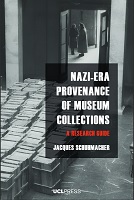Nazi-Era Provenance of Museum Collections
A research guide
Abstract
When we look at the artworks on display in museums, there is always a real possibility that some of these objects once belonged to victims of the Nazis – a possibility that has remained unacknowledged for far too long. Countless artworks were seized or forcibly sold, with many ending up in museum collections around the world, even in countries which actively fought to defeat Nazi Germany.
Nazi-Era Provenance of Museum Collections equips readers with the knowledge and strategies essential for confronting the shadow of the Nazi past in museum collections. Jacques Schuhmacher provides the vital historical orientation required to understand the Nazis’ complex campaign of systematic dispossession and extermination, and highlights the current environment in which museum-based Nazi-era provenance research takes place.
This book introduces readers to the research methods and resources that can be used to reveal the moving stories behind the objects, highlighting the absorbing work of provenance researchers as it plays out in practice.
Provenance research not only seeks to recover erased names and experiences and to reinsert them into a historical record, but also to ensure that the Nazis’ actions and worldview do not remain unchallenged in the galleries and storerooms of our museums today.
Praise for Nazi-Era Provenance of Museum Collections
‘Jacques Schuhmacher has written a hugely powerful, instructive and important book, tracing the historic responsibility of the museum world in addressing the legacy of Nazi-era loot. Fluently combining extensive historical scholarship with his expert understanding of investigative tools, this study uses compelling examples of restitution cases to show how provenance research should be done and, crucially, why it must be done.’
Dr Tristram Hunt, Director of the V&A
‘A timely work drawing upon first-hand experience in Nazi-era provenance research, providing a unique insight into the difficulties thrown up by the period. This book is sure to become a point of reference for those working in the field.’
His Honour Judge Baumgartner, Deputy Chair, UK Spoliation Advisory Panel
‘It is crucially important that we continue researching the history of ownership of our museum collections. Only then can historic wrongs begin to be rectified. By providing both a broad overview and individual case studies, Schuhmacher offers invaluable guidance on the complexities of Nazi-era provenance research’.
Gabriele Finaldi, Director of the National Gallery
‘A timely and user-friendly addition to the Provenance literature. Schuhmacher provides a how-to manual (complete with website addresses) and a much-needed clarification of immediate post-war restitution efforts. A must-have for all museum and art-world professionals.’
Lynn H. Nicholas, author of The Rape of Europa: The Fate of Europe's Treasures in the Third Reich and the Second World War
‘Allowing readers to understand the complex world of Nazi-era provenance research, this book is both a guide and a moving work of research in its own right. Jacques Schuhmacher is uniquely placed to write this book and to further the goal of material restitution.’
Professor Dan Stone, Director of the Holocaust Research Institute, Royal Holloway University of London
‘This is the place to start for anyone wanting to know about provenance research into looted Nazi-era works of art, or wanting to do the research themselves.’
Lord Inglewood, Chairman of the UK Advisory Group on Spoliation Matters
Keywords
Provenance research;Restitution;Museums;Art collections;Jewish art collectors;Holocaust;Looted Art;Nazi-era provenance research;Holocaust-era provenance research;Contested heritageDOI
10.14324/111.9781800086890ISBN
9781800086906, 9781800086913, 9781800086920, 9781787351400, 9781787354593, 9781800082984, 9781800085701, 9781800086890Publisher
UCL PressPublisher website
https://www.uclpress.co.uk/Publication date and place
London, 2024Series
Co-published with V&A,Classification
Forgery, falsification and theft of artworks
The Holocaust
Museology and heritage studies


 Download
Download